Our secondary students have started arguably, their most critical years at school, Form 5, which is the first installment of their A levels (senior studies).
Form 5 students Amani and Jacklyn are excited about the year ahead as they have a firmer idea about where their senior studies could lead to.
Amani has his heart set on becoming a doctor so he’s taking block subjects in science: including chemistry, biology and some geography.
“I want to be a doctor of medicine and I’m doing this because I come from a village where children suffer from various diseases, which haven’t been treated,” he said.
“I’m trying to study hard so I can become a doctor and discover some of the medicines and even ways of treating them, to help the children who are suffering in my village.”
Since Form 3, the students have had access to careers counselling so they are open to a wider possibility of options.
Many of the Form 5s are planning to get into medicine, engineering or science related fields but Jacklyn is keen to follow a different path and wants to pursue a career in the media.
“I want to get a Bachelor of Journalism and Mass Communication degree and work as a journalist,” she said.
St Jude’s has specially prepared the 136 Form 5 students before they embarked on their senior studies so they have a clear idea about what they want to do.
It is in Form 3 that they start to decide which path they want to take. With the help from career and guidance counsellors, the students map out how they can get into their dream jobs.
They then focus their studies in business, science or art and trained staff advise them on which subjects to take.
In their final school years, the students are doing extra study and seek assistance from St Jude’s teachers and others in boarding, when it's needed.
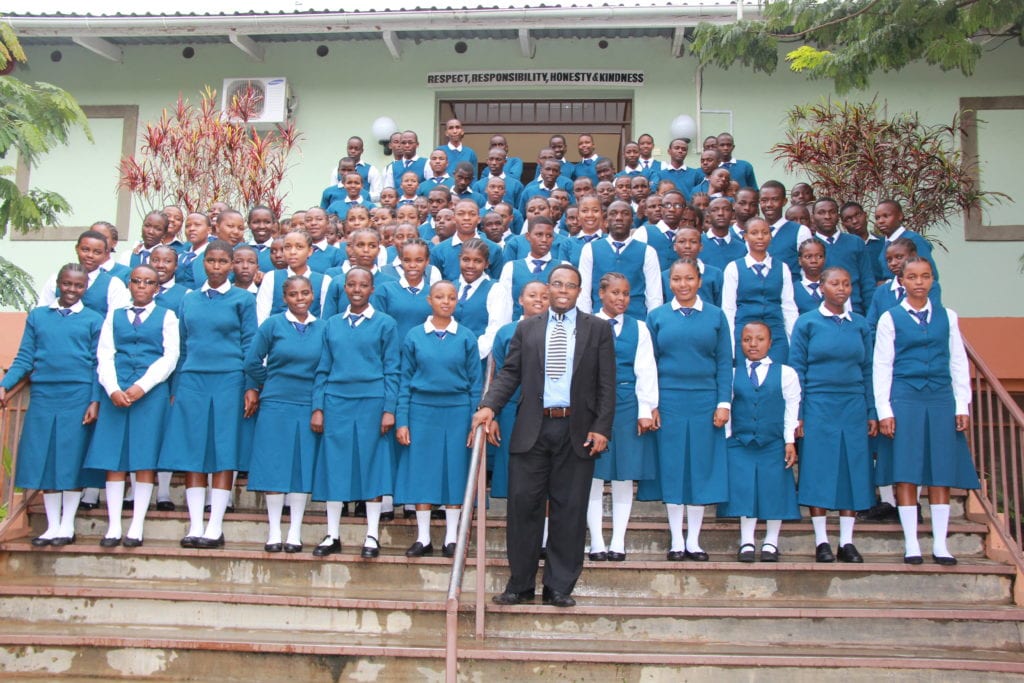
Two Lower Primary teachers at St Jude’s are going beyond the normal duties of teaching to help a little prep child, who is overcoming major hurdles, as he has albinism and suffers severe visual problems. Martha Dello and Anna Nnko are up for the challenge though and are doing all they can to help Sebastian succeed in his studies.
Sebastian started at St Jude’s in January and has gone through so much before he has even reached school age. It can be extremely dangerous growing up as an albino in Tanzania, as misperceptions about the condition are sometimes entrenched in rural communities. Many locals believe that the body parts or hair of an albino hold magical powers and sadly, it has led to an increasing number of killings across the country. Many families are persecuted if they have an albino child.
Sebastian is dealing with his visual problem which, for a little boy, is a lot to take on. He has also really benefited from the inclusive ethos of the school and his social skills are developing. “We showed him love and we accepted everything that he was doing,” said Anna. “We showed him the right way to do things and we also talked to other students that they should accept him as he is and help him wherever he fails, any kind of problem.”
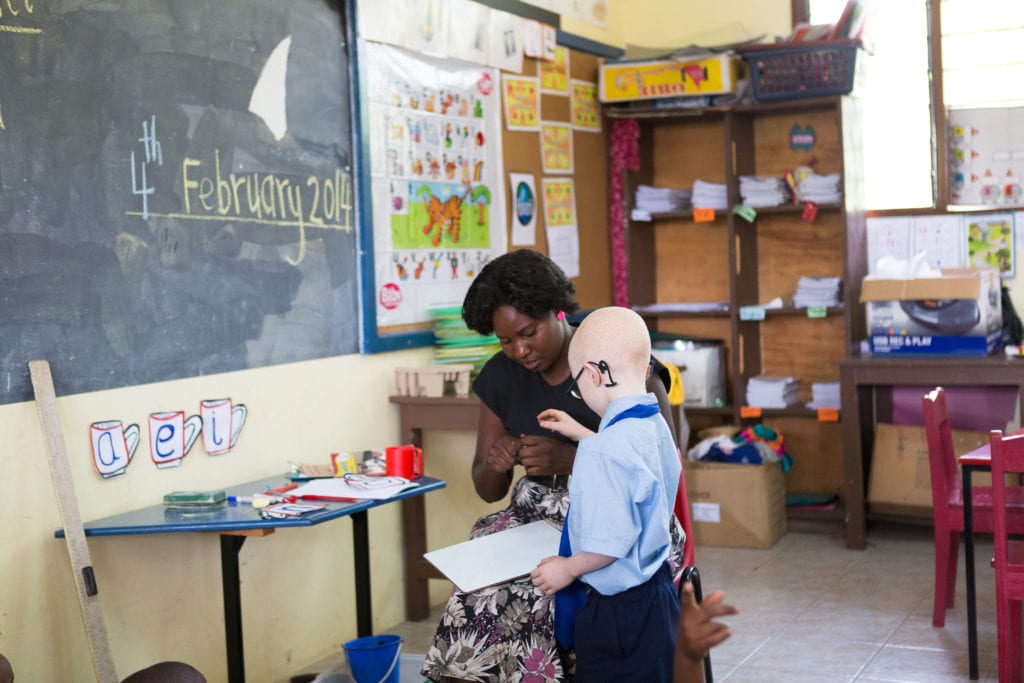
We are so grateful that we have been able to help Sebastian thus far, due to our Health & Welfare program, which operates on the foundation of assisting students who require extra needs. Though all of our students come from poor backgrounds, we have several students living in extremely difficult situations; students with serious illness, or dealing with other external issues such as abuse or mistreatment who require additional treatment and services. Our dedicated Welfare Deputies and their teams work hard to identify these students in each of our three campuses, and provide the required assistance within the means that we have.
Each case is dealt with sensitively and the school is willing to offer extra help when needed. St Jude’s considers Sebastian’s situation a special case and he will therefore receive financial assistance with any medical issues that will impact on his learning. We will also provide him and his mother transport to Kilimanjaro Christian Medical College Hospital, an hour away from the school, for regular medical treatment. The school is grateful for any funding it receives for its Health & Welfare program because it goes towards providing vital support for our students, like Sebastian.
We have recently fitted Sebastian with special glasses, in order to help him concentrate on his studies. St Jude’s has also received some additional visual aids for Sebastian, as a generous donation.
St Jude’s is determined to equip all of our students with the skills and confidence so they need for the best chance at developing a good life in the future.
As part of our current appeal, for $80 you can help two students for an entire year in our Health and Welfare program.
Zenith Media and Freudenberg show their community spirit by sponsoring the event.
Two Form 4 students, Eunice and Robert, took out first prize for their unique refrigerator project in the fourth annual St Jude’s Science Fair, held on Saturday, March 29th.
The students made the refrigerator out of tiles, cement, charcoal and other materials and it is designed for Tanzanian people who don’t have electricity in rural communities to use. Crops and other food can be preserved and stored in it.
It is a simple method utilising charcoals which are used for cooling and the tubes have porous holes to slowly leak circulating water. The tiles make the inside base for storage and the door is on top, while the double wall wire mesh allows the ventilation.
The students competed against many other innovative projects on the day, including a grinding machine which can be hand operated and used for juice and maize extraction while others developed computer software which could be used for online voting during African elections.
The judges granted the refrigerator first place based on its positive impact on society, its easiness to adopt because it doesn’t involve electricity, the time spent on the task, the application of scientific theory and method, its simple design and low cost.
The students have spent the past few months researching and developing their idea of a refrigerator which differs from what is currently available.
Both were overwhelmed by their win and Eunice took to the stage to accept the prizes, giving a moving speech. “Science is like a body of knowledge that you have to use and know what you think is right to help the entire society,” she said. “You really have to use all that you know and all that you have to bring changes in your societies.”
As part of the win, they received 100,000 TSH and a trophy.
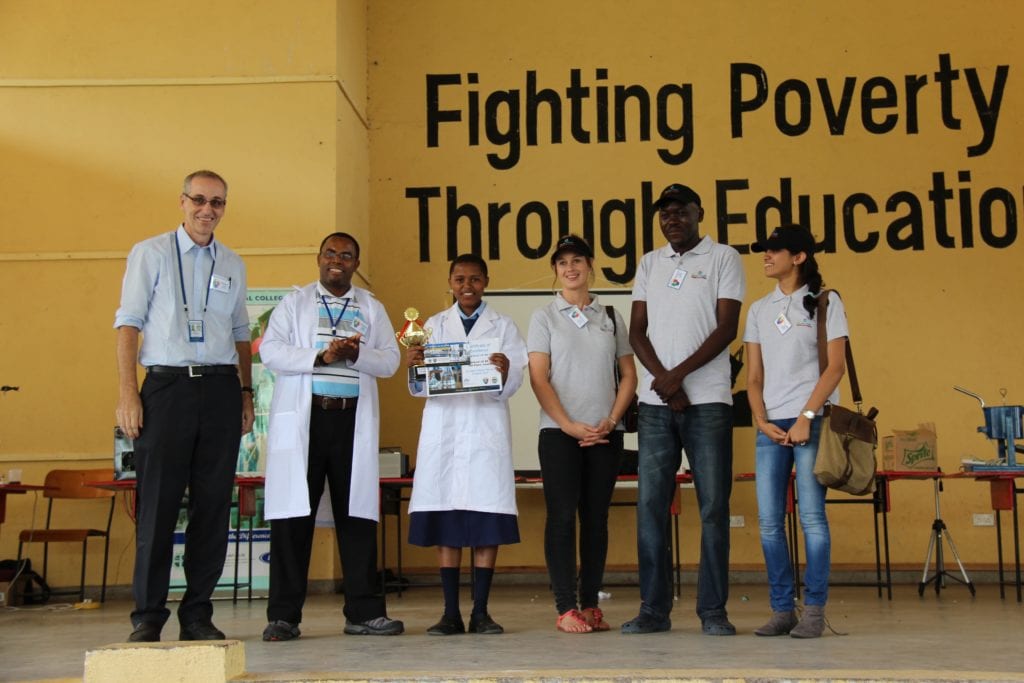
St Jude’s secondary students continue to perform extremely well in science subjects, national competitions and exams.
“Across the school, two-thirds of our students now do science and love it and many want to become scientists, technologists, doctors or engineers” said Mr Mcharo, Head of Physical science department and Assistant Academic Master. “Our best winner for science fair last year went on to compete for the Tanzania Young Scientists competition and got national recognition with several awards as they ranked 2nd in technology.”
The sponsors of the event, local company Zenith Media and Germany group Freudenberg, donated finances which went towards prizes on the day and science equipment for the school. Zenith Media hosted an engaging stall at the event, gave out merchandise on the day including pens, books and hats. They also had games for the students to learn and stay entertained.
“We’re always looking for the people of tomorrow, they need to be creative and think outside of the box when working with our clients and we’re very impressed by the projects the St Jude’s students have designed at this year’s science fair,” said Richard Mwalyambi from Zenith Media.
Around 150 visitors attended the event including the Arusha Technical College Edmund Rice, Uraki, Soreny Star high and Nkoasenga secondary schools.
St Jude’s students are notching up more awards in national essay writing competitions. Recently, Form 3 student, Joseph came 2nd in the ‘Back to School Essay Writing Competition’, conducted by Shule Direct based in Dar es Salaam.
Joseph wrote an essay about sustainable tourism, looking at the importance of educating a community on environmental conservation and how tourism can help a community to take more action to protect the natural environment.
We are also very proud of Denis in Form 3, David in Form 2 and Ayubu and Victor in Form 4 who made it in the top 25 list.
Joseph received 400, 000 TSH and a Samsung Galaxy Tablet for his win. All 5 of the students are expected to go to Dar to claim their prizes.
Here's Joseph’s winning essay:
Tourism
Do you like going on holidays? It is hard to find anyone who doesn’t. When someone goes on holidays and travels for recreation or learning and experience they become a tourist. Tourism is the temporary movement of people to destinations of their interest for pleasure or learning. There are two types of tourism, domestic and international tourism.
The topic of tourism caught my interest keenly with intentions to know more. The most interest was that, Tanzania is among countries with many tourist attractions. More than 44 percent of this land is covered with game reserves, national parks and other features. Moreover, Tanzania is the home to the famous roof of Africa, Mount Kilimanjaro.
Though tourism has positive and negative impacts, the demerits should not be overlooked but instead focus on the potential maintenance of sustainable tourism. This can be achieved by integrated approach that does minimum negative impacts to the natural environment.
According to my experience and the knowledge that I had obtained from this topic, I can use it to solve problems facing the community through a number of ways. I can educate the community on environmental conservation. The regular environment damage had led to the decrease and disappearance of plant and animal species. Activities such as poaching and forest burning leads to the destruction of natural environment which inhabits these species. The knowledge of tourism can help the community to increase the potential values to protect the natural environment.
To influence different cultures to participate in cultural tourism. So far some of the societies are involved, example; Maasai society, we can involve other societies with different cultures in order to extend the boundaries of tourism and marketing.
To emphasize the community about maintenance of peace and order. Such as avoiding civil wars and political instability which may be obstacles to the tourists and dwellers to move freely in the country. Therefore peace is the winning sprit of people to reach their destinations.
Through my ideas, I can influence the government to put strict laws to safeguard the environment and its inhabitants. Through these laws people can be aware and take precautions to outcomes of the law breakers. If these laws are implemented and adhered by the mass media we can be able to protect our resources for present and future generations.
In all, tourism being one of the biggest and fastest growing industry globally, its benefits and challenges keenly observed by the governments, affect the economic, socio-cultural, environmental and education resources. It has also brought about the creation of new jobs and revenue generated from foreign exchange, investments and payment of goods and services provided. It’s therefore the responsibility of each citizen to be committed in protecting the natural environment.
National school exams in Tanzania are tough and often used to gauge a students’ performance. Each year, Grade 7’s, 9’s and 11’s from St Jude’s and public schools from across the country, have to pass the exam to be able to move on to the next level of secondary school.
For the students in government schools who fail, they are forced to leave their education and then find ways to support themselves and their families. They become part of the millions of children worldwide who don’t attend school.
Many Tanzanian children in government schools are learning in classes of up to 150 other students with few textbooks and few teachers. Despite their limited access to a well-rounded education, the students still have to sit the national exam.
St Jude’s believes that children living in poverty need to be on an equal playing field to other students in international and private schools that get a good, high quality education. It is why our supporters from all over the world have backed St Jude’s by investing in our students’ free, high-quality education so they have a higher chance of escaping a life of poverty.
Students are able to focus on getting good grades and the right exam results to move to the next level of their education and we are confident that they will go on to study at good universities so they can become future community leaders.
As well as ensuring that they have the tools to pass their exams, we’re committed to providing them with the resources and other lessons so that they can become critical and creative thinkers.
Impressively, our Form 2 students ranked 4th out of 355 schools in the North West zone of Tanzania in the recent national exam; while our Form 4’s came in 3rd in the region and 20th in the country. The Form 4’s improved on last year’s results with more students achieving Division 1 and 2, which is equivalent to an A or a B.
A lot of work goes on behind the scenes to prepare the students for the big tests. Firstly, there are committed Tanzanian teachers mentoring and supporting students in their lessons.
“Our academic department works tirelessly to ensure our students get a quality education in terms of the skills and at the same time produce best results,” said St Jude’s Secondary Headmaster Rasul Abdul.
The students do a series of mock exams to see how they’re faring in their subjects and if there’s room for improvement. They are not the sole measure of determining a students’ performance but are a good indication.
Our students also put in extra study hours so they can do their best on the day. Once the national results are released, the headmasters and academic staff will do an analysis and find ways to help them improve in their subjects.
Our students strive to do well in their exams because they highly value their education at St Jude’s. Godwin in Form 3 was one of the top tier performers in his class in the last exam.
“It was my first time to be at the top and it felt so nice because it’s where I planned to be,” said Godwin. “I like to do well in my studies because I want a good life in the future and to be able to help others coming after me in lower grades.”
You can make your mark on our students’ lives by donating to our current appeal. Choose from a range of items such as a computer to share for our students or textbooks needed for three classes for a year. By investing in educational resources at our school, you can see our students flourish academically and perform their best in exams.
Find out more about the Make Your Mark Appeal and becoming a sponsor on our website.
Susan Michell sits on a little children’s chair in a classroom with seven- and eight-year-old students. Having more than 30 years experience in primary, secondary and special education classes, she is here to demonstrate to St Jude’s teacher Robinson Mollel her suggestion how to use a set of flash cards that were donated to the school.
Susan pulls out the first card. It has the drawing of a stick figure behind a box with the word “behind” written above it. “Listen, look and speak,” Susan instructs the students. “Behind,” she says. “Behind,” they repeat in unison. She grabs a container, one of the many materials she is seen carrying around campus, and asks a student to demonstrate the word. The girl gets up, gets the box and places it behind her back. The class claps.
Robinson joins the exercise and the children practice words and phrases such as “under”, “on top of”, and “in the middle of.” He makes sure to call on different students, and lavishes praise on them. The kids put big smiles on their faces and clap.
“They love it when we use the new materials the mentors demonstrate to us,” says Robinson.
The partnership between Susan and Robinson is an example of how St Jude’s teacher mentors program works. Currently eight experienced volunteers from New Zealand, Australia and the U.S. work in the program across three campuses. They bring some of the best ideas for teaching and learning from around the world, and make up one of the pillars of St Jude's quality education.
“The mentors work alongside our talented local teaching staff helping to integrate new ideas into the Tanzanian curriculum as we seek to provide a quality education for the students,” says Jon Ford, St Jude’s School Director.
A few meters away from Robinson's class, Liz Underwood is busy sorting through the new books and resources recently donated to the school. She makes sure everything is classified into school grades and subjects, and works with teachers to come up with ideas on how to use them in the classroom.
“I help teachers put together hands-on and fun lessons for the kids,” says Liz.
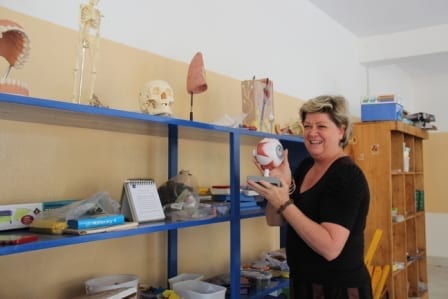
"The teachers are working with mentors to try to implement changes that we all believe could work better for the students' learning process," says George Stephen, Lower Primary Headmaster.
Lower Primary mentor Lynn McMahon is an early childhood specialist with 30 years experience teaching both children and adults in this field. One of her current projects is encouraging teachers of the youngest children to integrate the Tanzanian curriculum across different departments. “The idea is for lessons to be linked across all subject areas,” says Lynn. “This provides reinforcement of new ideas and deeper understanding of new topics, and enhances the development of their new language.”
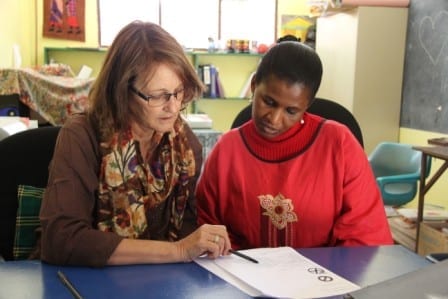
Over at Smith campus, which houses the secondary school, Linda Kitto spends some time researching local plants and discussing experiment ideas with the biology teachers. St Jude’s has a total of eight science labs for Physics, Biology, Chemistry, and multipurpose uses.
The teachers use the labs to make the curriculum come to life with practical experience of scientific concepts. Many students in Tanzania only get to do science from a book. Most don't even have access to science books.
“The mentors suggest experiments and show how to use them effectively to introduce a new topic,” says Humprey Nkya, Head of the Biology Department.
“We share ideas and experiences,” says Rasul Abdul, Head of the Secondary School. “We learn from each other how to make lessons even more engaging.”
St Jude’s mentors specialize in different areas. Glenyce Surtees is a library educator. She creates programs to help teachers and library staff to enhance their research skills and look deeper for different sources of information throughout the school’s more than 30 thousand books, DVDs and CDs (not including textbooks) in three libraries.
Sika Somberg acts as a career guidance mentor. She works closely with teacher Mshauri Calistus to create activities and counseling sessions. The two want to raise the students’ awareness about the broad range of professional paths they can pursue after high school graduation.
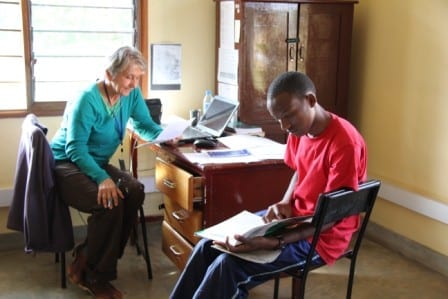
St Jude’s academic leaders are actively involved. Every week a group of Upper Primary school leaders sit around a table with Gaye Tiplady and discuss leadership methods and techniques to ensure St Jude’s meets its strategic goals. Gaye has over 25 years of experience in education, 11 of which as principal of a primary school in New Zealand.
On a recent Monday morning the topic was the school’s goal of being a center of excellence. The discussion focused on how to help underperforming students.
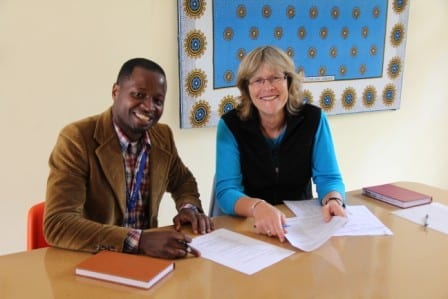
“I take strong responsibility for student performance,” said Peter Manjalla, Headmaster of Upper Primary. “Our job is to make sure every student passes.”
The leaders first identified a clear goal: for all underperforming students to improve their marks. Each one suggested a number of strategies, which were listed and then combined into four, ranging from the proper use of available resources to each child getting individual support and encouragement.
“Leaders have to make lots of difficult decisions, so we really appreciate Gaye’s advice and guidance,” says Peter.
“We support the teachers and leaders through guidance, coaching and responding to requests for assistance in a particular area,” says Gaye. “Our aim is to build capacity in the academic staff so it’s important that they feel empowered and comfortable with what is being suggested.”